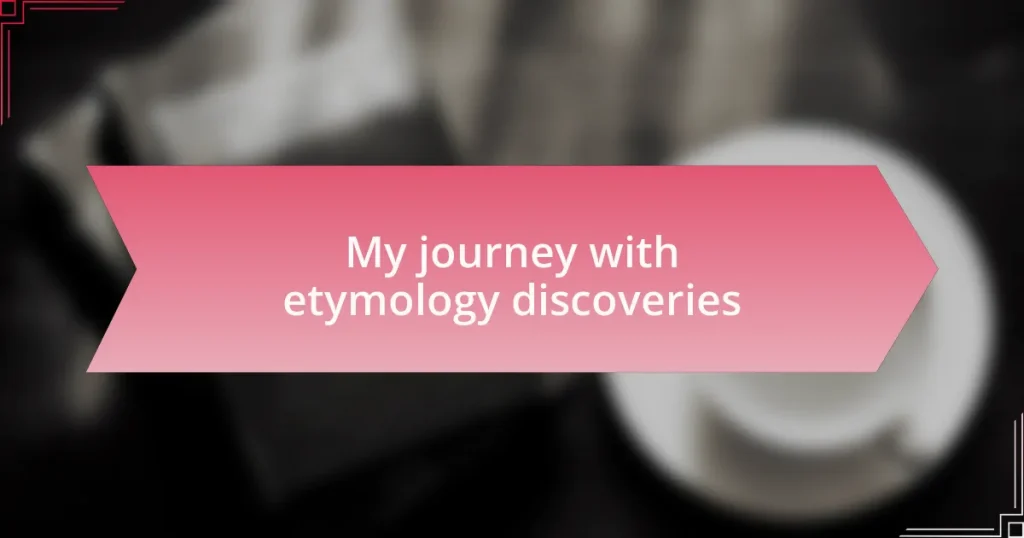Key takeaways:
- Clara Whitfield emphasizes the deep connections between words and their historical origins, enhancing our understanding of language and culture.
- She highlights personal experiences that sparked her interest in etymology, showcasing how a word’s history can resonate with human experiences.
- Key resources for studying etymology include the Online Etymology Dictionary and the Oxford English Dictionary, which reveal the evolution of words over time.
- Understanding etymology enriches daily communication and literature appreciation, transforming simple conversations into deeper explorations of language.
Author: Clara Whitfield
Bio: Clara Whitfield is a captivating storyteller and acclaimed author known for her rich, character-driven narratives that explore the complexities of human relationships. With a background in psychology and a passion for literature, Clara weaves intricate plots that resonate with readers on multiple levels. Her debut novel, “Echoes of the Heart,” received critical acclaim and was a finalist for several literary awards. When she’s not writing, Clara enjoys hiking in nature, experimenting in the kitchen, and engaging with her vibrant community of fellow writers. She resides in Portland, Oregon, where she draws inspiration from the lush surroundings and eclectic culture.
Introduction to etymology discoveries
Etymology, the study of the origins of words, has always fascinated me. I remember the thrill of learning that the word “panic” comes from the Greek god Pan, who was believed to instill irrational fear in people. This revelation made me ponder how language is filled with such rich histories that shape our understanding of the world.
Diving into etymology feels like embarking on a treasure hunt through time. Every word carries with it stories from different eras and cultures. For instance, I was surprised to discover that “salary” is derived from “sal,” the Latin word for salt, which was once a highly valued commodity. Isn’t it intriguing how a simple term can connect us to trading practices of the past?
As I reflected on my etymological discoveries, I couldn’t help but wonder: how many words we use daily are tethered to stories we’ve yet to uncover? The realization that language is alive, evolving, and steeped in history has deepened my appreciation for the English language. Each exploration not only enhances my vocabulary but also enriches my understanding of humanity’s shared experiences.
Importance of etymology in language
Understanding etymology is crucial for grasping the nuances of language. When I learned that “whiskey” comes from the Gaelic word “uisce beatha,” meaning “water of life,” it sparked my curiosity about cultural perceptions of beverages. It’s fascinating how the origins of a word can reveal deeper meanings and values within a culture.
Words are more than just tools for communication; they are windows into history. Reflecting on my experience, discovering that “cliché” originally referred to a printing plate used in 19th-century France opened up a new layer of meaning for me. How powerful is it that a term we often associate with overused phrases has such a vivid origin?
Etymology also fosters connection and empathy. When I understand the roots of words, it feels like sharing a secret with others who know these histories. How many connections could we forge if we explored the stories behind our words? Each etymological discovery not only deepens my knowledge but also enhances my appreciation for the shared tapestry of human expression.
My initial interest in etymology
It all started unexpectedly one afternoon while I was thumbing through an old dictionary. I stumbled upon the word “salary,” which comes from the Latin “salarium,” originally tied to the payment workers received for collecting salt. That connection hit me hard—salt was once so valuable that it literally helped shape economic systems. It’s amazing how a single word can encapsulate not just a monetary concept, but a whole historical narrative.
My fascination only grew when I began to connect words to the stories they tell about human experience. I remember feeling an electric thrill when I learned that “quarantine” originated from the Italian “quaranta giorni,” meaning forty days. This knowledge made the word resonate with more significance during times of illness. Isn’t it intriguing how our language evolves alongside our experiences?
As I delved deeper, I found myself drawn to the interplay of language and identity. Discovering that “genuine” comes from the Latin word “genuinus,” meant “of birth,” was like uncovering a piece of my own heritage. How often do we think about the stories entwined within our daily vocabulary? These revelations not only fueled my curiosity but also instilled a sense of belonging to the broader story of humanity.
Key resources for etymology study
When I first started my exploration of etymology, one resource quickly became my go-to: the Online Etymology Dictionary. It’s a treasure trove of word origins, offering detailed histories that genuinely bring words to life. I remember spending hours tracing the roots of words I encountered daily, often leading to fascinating connections I had never noticed before. Have you ever thought about how much depth a simple word can hold?
Another invaluable tool is the Oxford English Dictionary (OED). It’s not just a dictionary; it’s a comprehensive historical account of the English language. I recall the excitement of using OED to uncover the various shifts in meaning and usage over centuries. The experience of seeing how words adapt to culture and context was eye-opening. It made me realize that language is a living entity, constantly evolving. How often do we consider the stories behind the words we take for granted?
Books like “The Etymologicon” by Mark Forsyth are also fantastic for anyone wanting deeper insights into word histories. I once read a passage in it about how the word “whiskey” traces its roots back through language and time, connecting various cultures. That moment left me feeling a sense of wonder about our interconnectedness through language. Have you ever paused to think about the heritage embedded in the words you speak every day?
Etymology applications in daily life
When I reflect on my daily interactions with language, I often find myself applying etymology unconsciously. For instance, when I use the word “quarantine,” I recall its origins from the Italian “quaranta giorni,” meaning forty days. This awareness not only enriches my understanding of the word’s meaning but also gives me a sense of connection to the historical context surrounding public health. Have you ever considered how the history of a word can lend new weight to its current usage?
In conversations, I’ve noticed how sharing the etymology of a particular word can spark curiosity and dialogue. I once casually mentioned that “salary” comes from “sal,” the Latin word for salt, leading to an engaging discussion about trade and value in ancient times. It’s fascinating to see how a simple explanation can turn an everyday conversation into a deeper exploration of language and history. How do you think the stories behind words can influence how we communicate with one another?
I also find that understanding word roots can enhance my appreciation for literature. Reading Shakespeare, for instance, becomes even more enjoyable when I uncover the layers of meaning behind the words he chose. Knowing that “happiness” is derived from “hap,” which relates to luck or fortune, reshapes my perspective on the themes of fate in his works. How does learning about word origins shift your understanding of the texts you love?
Sharing my favorite etymology insights
One of my favorite discoveries has been the word “disaster.” It originates from the Italian “disastro,” which combines “dis-” (bad) and “astro” (star). This etymology strikes me because it implies that misfortune was once thought to be influenced by the stars themselves. Have you ever thought about how our perspectives on fate can be shaped by such historical beliefs?
Another gem I stumbled upon is the word “nostalgia.” It comes from the Greek words “nostos,” meaning return, and “algos,” which means pain. The idea that longing for the past can embody such a poignant pain resonates deeply with me. When I think of my childhood memories, I often feel a bittersweet mix of joy and sadness. How do you grapple with the memories that pull at your heartstrings?
I also find the etymology of the word “clue” quite intriguing. It traces back to the Old English “clew,” which meant a ball of yarn. This connection makes me visualize the mythical thread that guided Theseus out of the Minotaur’s labyrinth. It’s a reminder that words can weave stories together in unexpected ways. Can you recall a moment when a single word unraveled a complex thought or feeling for you?















